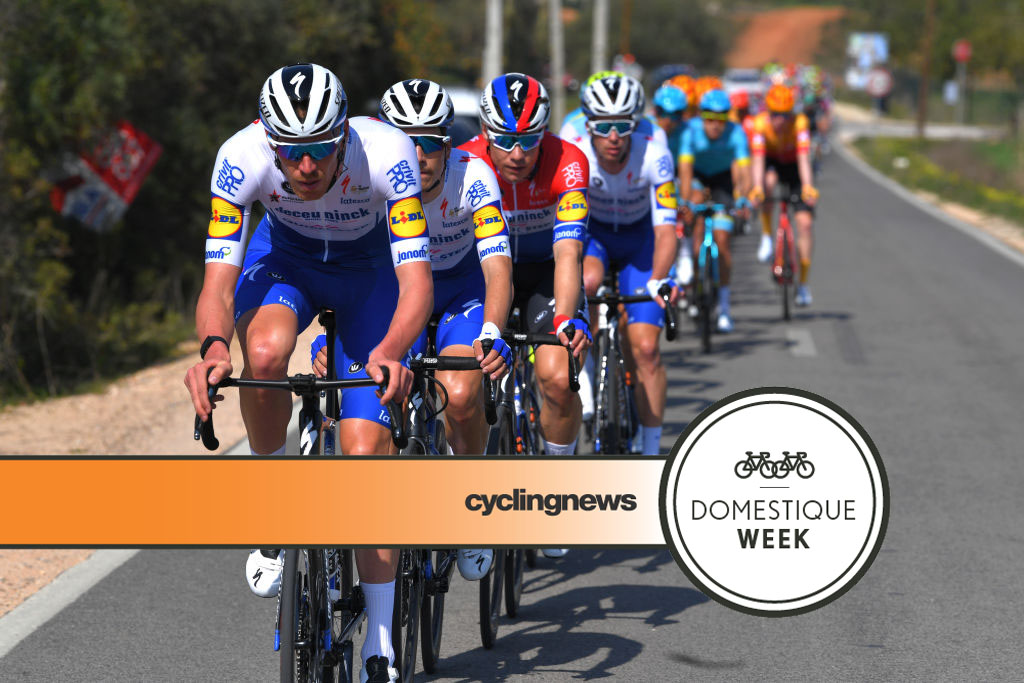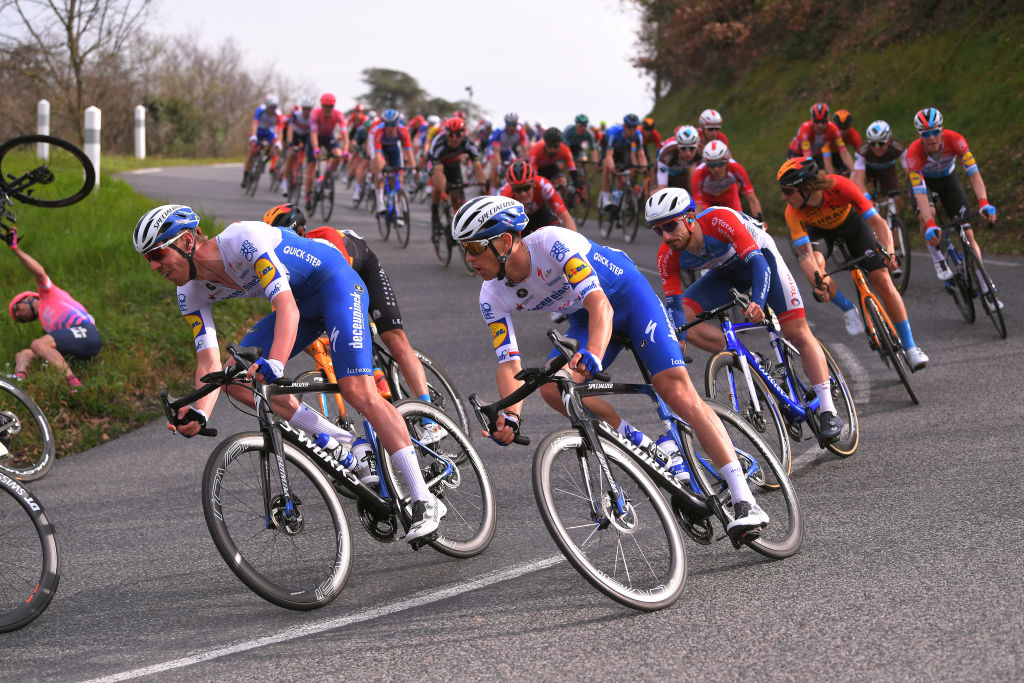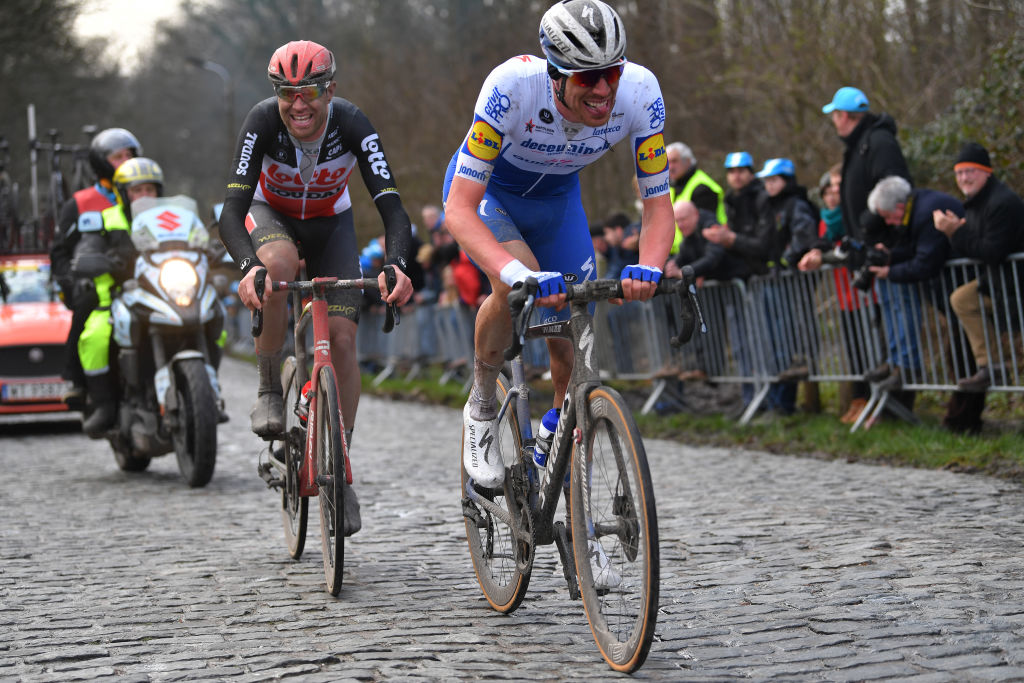Tim Declercq: Everyone knows I'm not a Ferrari
'El Tractor' on pulling pelotons, wanting 'others to have it good' and wondering how victory might taste



A man's got to know his limitations. The words of wisdom from Clint Eastwood's Dirty Harry seem firmly ingrained in Tim Declercq. "I know I'm not the biggest talent in the sport," the 31-year-old Belgian says – on more than one occasion – as we ask about his role as one of cycling's domestiques.
Not to be mistaken for a lack of ambition, accepting one's limitations can, conversely, open more doors of opportunity than are closed, and Declercq has made a name for himself as one of the most highly regarded and highly valued 'helpers' in the peloton.
He has never won a professional race but, with his Deceuninck-QuickStep team clocking up 231 victories since he joined in 2017, he has contributed extensively to the success of others.
"Everybody dreams of becoming the best in the world, but I was always more realistic," he says.
"I knew it would be hard to ride for myself, especially at the highest level, so then you have to know what you can and cannot do. I prefer to be a helper in what was always my dream team – and still is – rather than ride for myself at a lower level. I understand for some guys it's not so easy, but for me it was an easy choice."
Declercq's chief limitation is his lack of explosiveness. He's a classic example of what's known as a 'diesel engine' – someone who can hold steady power for sustained periods but lacks the zip and punch needed to produce sharp injections of pace.
As journalist Hugo Coorevits put it – albeit rather bluntly – in a recent edition of Belgian newspaper Het Nieuwsblad, "He has the acceleration of an aged snail."
Get The Leadout Newsletter
The latest race content, interviews, features, reviews and expert buying guides, direct to your inbox!
Declercq takes this all in good humour.
"If I end up in a sprint of seven guys, I'm going to be seventh," he freely admits. Similarly, he has embraced the nickname of El Tractor, which stems from his first race for QuickStep at the Vuelta a San Juan, where the typically inventive local broadcasters sought to describe the two-metre-tall machine they saw pulling the bunch along all day, every day.
"The name 'El Tractor' suits me," Declercq says. "Everyone knows I'm not a Ferrari, but I'm quite reliable in my job."
Declercq knew from an early stage that he was no Ferrari. If his performances in the junior and under-23 ranks weren't proof enough, there were the physiological tests that showed a near-complete absence of the type-2 – or 'fast-twitch' – muscle fibres typically possessed by sprinters. In fact, the writing was on the wall from his very first race.
"I started racing when I was 12, with a friend of mine, and our first race was on the track – a scratch and a 500-metre time trial. In the time trial, I was second to last and he was last, and then in the time trial, he was last and I was second to last."
It was a shaky start, then, but, a few months later, Declercq got his first taste of road racing, which brought his stamina into play, and those same tests showed a remarkably high VO2 max for his height.
"I was immediately third," he says. "I could already see that the track wasn't for me but, fortunately, there was something for me on the road."
The early years
The absence of delusions of grandeur can be traced back to those first adventures on the bike around Leuven, 20 kilometres east of Brussels. The son of a comedian and a teacher who "didn't know anything about bikes", Declercq's passion for the sport was organic.
"I had to do it all myself. I didn't have anyone to clean my bike or repair punctures. My parents drove me to races but they said, 'It's your hobby, so you have to do it for yourself.' That's why I enjoy cycling nowadays so much; I know what I had to do for it," he says.
"My parents never gave me the best material – always second-hand – but they put a lot of money into a good heart-rate monitor and also some scientific testing. They thought this was much more important for my development. Also, until I was a junior, they never let me race more than once a week, so I could never be burnt out."
Despite some health issues, Declercq impressed throughout the junior ranks, and making a career out of cycling began to seem like a realistic prospect. However, his move to the U23 ranks coincided with his move to Gent to study physical education at university, where, he says subtly, "I discovered that life a little bit." Trying to combine his studies and his riding, he fell short on both counts but managed to get his "act together again" after a couple of years.
"Still not doing too much training, I finished seventh at the U23 Paris-Roubaix. At that moment, I knew I wasn't doing everything I could, and that it was maybe still possible to become a pro. I broke my elbow, so that year was difficult, but I knew I had one last shot in my final year as an U23."
He made it count, winning two stages of the Ronde van Namen and the Belgian national U23 road race title. They were all exacting races but still required a sprint finish.
"I've always been a diesel, but back then it was maybe more turbo-diesel," he jokes.
Those results saw Declercq land a professional contract at Topsport Vlaanderen, a renowned conveyor belt of Belgian talent through which the likes of Thomas De Gendt, Iljo Keisse, Yves Lampaert and Oliver Naesen found their way to the WorldTour. To this day, he rides in a training group – known as De Melkerie – with Lampaert and fellow Topsport alumni Stijn Steels, Bert Van Lerberghe, Jens Debusschere and Jonas Rickaert.
"I think it was the best choice to develop a bit at Topsport," says Declercq. "I was for sure not ready for WorldTour level from the beginning."
In his first year, Declercq won the IWT Oetingen, and went back and won it again in 2013. Although a UCI-classified event, it's a 1.2 race, open to local club teams, and therefore not universally considered a 'professional' race.
Although Declercq would like to count it – pointing to a top 10 in 2013 that included Dylan van Baarle, Mike Teunissen, Jelle Wallays and Silvan Dillier – he defers to Procyclingstats.com as the authority and accepts his official pro win tally is still a round zero.
Declercq extended with Topsport but reached a hiccup in his career when he was diagnosed with mycoplasma, a disease that affected his lungs, in 2014. Results were hard to come by for a good year but, once again, he bounced back when it mattered, catching the eye of QuickStep boss Patrick Lefevere over the Belgian spring in 2016.
Still, there was more work to do.
"I knew they were looking for a domestique and were thinking of me, so I decided to take matters into my own hands and I wrote Patrick an email in which I said what I thought I could do," Declercq reveals.
"I said that I was never going to be a real champion in the team but I had no problem doing all the work. He was happy with this, let me do some testing, and the results were good, so he decided to take me."
'It's more tactical than people think'
Just over three years on, and Declercq has become the team's most reliable domestique and one of the most esteemed in the entire peloton. His imposing figure – those burly shoulders that jut out and then lead down to where his enormous hands meet bars that seem like they belong on a child's bike – is now instantly recognisable.
He stands out given the prominent role Deceuninck-QuickStep so often play in controlling breakaways and, moreover, given the enhanced television coverage that has recently thrown a spotlight on those hitherto mysterious early kilometres.
"At Topsport, I was always good in races that were hard from the beginning and didn't wait until one moment to explode, so I knew riding on the front would be a good job for me," Declercq says. "It's a long time at the sub-maximal level, and I'm good at those efforts."
There are people who would find Declercq's riding boring. Our natural inclination towards underdogs turns him into something of a hope-crusher, while his metronomic cadence will never raise the heartbeat of the casual viewer. That said, the notion of the plodding peloton-puller performing his heavy lifting almost unthinkingly is one Declercq is keen to dispel. He's a racer, no doubt.
"It's more tactical than people think. I'm actually calculating the whole time, looking at the watch, thinking about the breakaway's tactics – are they going full gas now, or do they have something in the tank to speed up later? It's deciding the moments to go harder and the moments to step back. Then, in stage races, you have to think about the next day.
"I'm really a geek when it comes to power meters and watts but you also have to believe in your feeling, and that's something you learn with getting old and doing this job a long time."

Declercq may not have tasted victory for himself at QuickStep, but he has had a hand in quite the collective palmares. Milan-San Remo, the Tour of Flanders and Paris-Roubaix, along with four stages at the Tour de France and 10 at the Vuelta a España, have all been won a couple of hours after some solid Declercq graft.
"You'd be lying if you said you were as happy as if you'd won for yourself, but I can say this truly and from the heart, that it comes really close," he says. "Cycling has become more and more of a team sport, so you feel more a part of that victory. It's not on your books, but still you feel it."
Every rider who wins a race thanks their teammates, even when they've contributed ostensibly very little, but, when you speak to those at Deceuninck-QuickStep, their regard for Declercq seems heartfelt and genuine.
"I really feel a lot of appreciation at this team," Declercq says. "It's the small things, like when I got married last October, I got a personalised espresso machine. It wasn't necessary, but they showed their appreciation, and from me it was also much appreciated that they did."
Declercq, though, isn't merely the humble servant at Deceuninck-QuickStep. Although he says he likes "for other people to have it good", he insists that it's purely his physical profile that has pigeonholed him as a domestique.
"If I had the quality to be a leader, I think I'd be able to be a leader, mentally," he says. "I like to say what I think – always with respect."
For evidence, look no further than last year's Vuelta a España, and specifically stage 19 when Movistar attacked and split the race just after the overall leader Primoz Roglic, of the Jumbo-Visma team, had crashed. Once things had settled down again, Declercq picked out the rainbow jersey of Movistar's Alejandro Valverde and left him in no doubt about what he thought of their opportunism.
"I have to say that I have a lot of respect for Valverde, but still, that move I really couldn't appreciate. It's a bit of a shame for a world champion. Of course, it's the team director who told them to pull but, for me, if you're Alejandro Valverde, you are Movistar, so I think it was up to him to say, 'We won't pull.' They apologised later, so for me it was fine. I can always forgive people quite easily."
'In the last year, I've surprised myself a bit'
Declercq repeatedly insists that he's "never going to be a leader", but still, he has begun to outgrow his reputation as a mere early-kilometre gobbler.
At last year's Le Samyn, he found himself in the decisive selection and launched an attack that, for a split-second, looked as though it might carry him to victory, before his teammate Florian Sénéchal took the spoils. Later in the season, after helping Julian Alaphilippe to victory at Milan-San Remo and Philippe Gilbert to the win at Paris-Roubaix, Declercq went from strength to strength and rode a highly-impressive Vuelta, which landed him a spot in a star-studded Belgian squad for the World Championships.
This year, he picked up where he left off and rode the race of his life at the Omloop Het Nieuwsblad a month ago. Echelons splintered the bunch after 60km so his time 'pulling' was cut short, and when a move went with some 80km remaining, he marked it, never thinking it would go all the way to the line.
Part of the reason it did, of course, was Declercq himself, who was swiftly told by his team car to drive the pace while teammate Yves Lampaert tucked in behind. Lampaert eventually lost out to Jasper Stuvyen in a two-up sprint and regretted he couldn't finish it off for the sake of Declercq, who fought on to finish fifth, whiskers ahead of the chasing group.
"In the last year, I've surprised myself a bit – that I could do a bit more in some races," Declercq says.
"I'm never going to be a team leader and I have no problem with that, but I also really like it that the team, in lower-level races, has given me the opportunity to work but not really from the beginning. It's nice to taste the finale, because if you're pulling from kilometre-zero, you're never going to make the final."

So high was his confidence after the Omloop Het Nieuwsblad and Paris-Nice that Declercq can't help feeling doubly frustrated that the spring calendar has been wiped out by the coronavirus pandemic. With the summer's racing also in serious doubt, the form of his life could be completely wasted but, despite turning 31 last week, he insists there's more to come, whenever the racing resumes.
"Of course, it's realistic that the progression is not going to be really big anymore but l think I can improve a bit more physically and tactically," he says. "I think I'm capable of doing this job for quite some years yet, and let's hope it remains that way for as long as possible."
Declercq's staying power on the front of a peloton is in little doubt. The question, after those recent forays into the so-called 'finals', is whether he can one day go all the way to the finish line and raise those big arms aloft.
"It would be really nice, personally, to win a race one day, but my biggest goal is to do my job for the team," he says dutifully.
"I prefer not to put too much pressure on myself, because I know it's going to be hard for me, especially with the programme I have now, with a lot of big races. If I have the chance one day to win a race, I would really love it, I have to say. But also, if I never win a race, I think my career will not be in vain."
He pauses, before adding: "But it would be a nice moment…"
Patrick is a freelance sports writer and editor. He’s an NCTJ-accredited journalist with a bachelor’s degree in modern languages (French and Spanish). Patrick worked full-time at Cyclingnews for eight years between 2015 and 2023, latterly as Deputy Editor.
